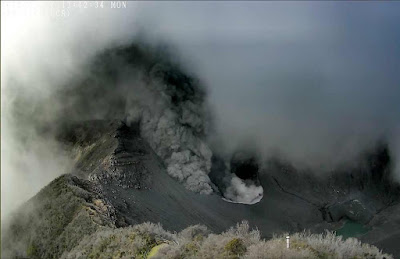The Observatorio Vulcanológico y Sismológico de Costa Rica-Universidad Nacional reported a short explosive eruption which lasted about ten minutes, beginning slightly after 1.10 pm local time on Monday 7 December 2015. The eruption produced an ash column about 400 m high that drifted to the west, potentially leading to ashfalls in the outer suburbs of northeastern San Jose. Turriabla has been erupting intermittently since 2010, after a quite phase that lasted from 1886, though it has been mostly quiet in the second half of 2015.
Explosive eruption on Mount Turrialba, Costa Rica, on 7 December 2015. Red Sismológica Nacional/Universidad de Costa Rica.
Turrialba
forms part of the Cordillera Central, a range of volcanic mountains
running through central Costa Rica and forming part of the Central
American Arc. These volcanoes are fueled by the subduction of the Cocos
Plate, which underlies part of the east Pacific Ocean, beneath the
Caribbean Plate, on which Central America lies, along the Middle
American Trench, which lies off the south coast of the country. As the
Cocos Plate is subducted it is gradually melted by the heat and pressure
of the Earth's interior, with some more volatile minerals rising
through the overlying Caribbean Plate as volcanic magma.
Diagram showing the passage of the Cocos Plate beneath Costa Rica (not to scale). Carleton College.
See also...
 Eruption on Mount Turrialba, Costa Rica. The Observatorio Vulcanológico y Sismológico de Costa Rica-Universidad Nacional reported
an eruption on Mount Turrialba, a stratovolcano (cone shaped volcano
made up of...
Eruption on Mount Turrialba, Costa Rica. The Observatorio Vulcanológico y Sismológico de Costa Rica-Universidad Nacional reported
an eruption on Mount Turrialba, a stratovolcano (cone shaped volcano
made up of... Magnitude 4.6 Earthquake off the coast of Limón Province, Costa Rica. The United States Geological Survey recorded
a Magnitude 4.6 Earthquake at a depth of 18 km, slightly off the coast
of Limón Province in northeast Costa...
Magnitude 4.6 Earthquake off the coast of Limón Province, Costa Rica. The United States Geological Survey recorded
a Magnitude 4.6 Earthquake at a depth of 18 km, slightly off the coast
of Limón Province in northeast Costa...
The Observatorio Vulcanologico y Sismologico de Costa Rica-Universidad Nacional in
Costa Rica reported a large phreatic eruption on Mount Poás, a volcano
in the central part of the country, slightly after noon local time
(slightly after 6.00 pm GMT) on Tuesday 25 February 2014. Phreatic
eruptions occur when...
Follow Sciency Thoughts on Facebook.



